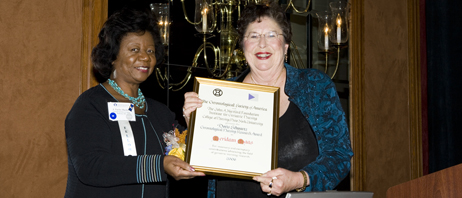
Strategy No. 3: Showcasing Excellence to Transform Geriatric Nursing

Presenting awards for outstanding work in research, education, curriculum development and practice is a high-profile, low-cost strategy that brings national attention to geriatric nursing. "The strategy behind giving awards is to send the message to important audiences that there are exemplary nurses and institutions delivering high quality care to older adults and therefore everybody can and should be doing it," says Dr. Mezey.
In a world of sensationalized news coverage, of course, too often it is poor rather than excellent care of the elderly that captures professional and public attention. Ageism, still so prevalent in society, spills over to stigmatize the nurses who work with the elderly. Negative perceptions within and outside the profession can derail attempts to generate interest in geriatrics among nursing students, recruit nurses to practice in geriatric settings, garner support for geriatric nursing research, and promote public policy favorable to geriatric nursing. By recognizing excellence in geriatric nursing, these perceptions can be turned around. Awards provide encouragement and validation for individual recipients. But the impact is potentially far greater. By strategically giving awards, there is a ripple effect which inspires others toward greater achievement in the field, attracts nursing students to pay greater attention to geriatrics, and creates positive perceptions about care of older adult patients in the wider health arena.
"Our strategy is to showcase achievement by creating awards that recognize recipients among their peers and other audiences," says Dr. Mezey. The first is the immediate professional environment of the recipient. Professors who receive awards are recognized within the institution in which they work. The second audience is the wider community of, for example, the specialty association or other appropriate organizations. Finally, the larger nursing community, reached through press releases to appropriate media outlets and by presenting awards in a forum where they will receive the greatest attention, can learn about geriatric nursing as a result of publicity surrounding the awards.
The Hartford Institute has succeeded in this strategy by developing partnerships with large national organizations. By presenting awards at national conferences, such as meetings of the American Association of Colleges of Nursing, the Gerontological Society of America, and the American Organization of Nurse Executives, the visibility and prestige of the work of geriatric nurses is recognized. "There have always been pockets of excellence in geriatric nursing, but these awards add legitimacy to what geriatric nurses are doing," says Dr. Mezey. "They don't have to feel alone, because they've joined a group of professionals who are recognized over time for a body of excellent work.
Visit the Hartford Institute for Geriatric Nursing Web site: www.hartfordign.org
